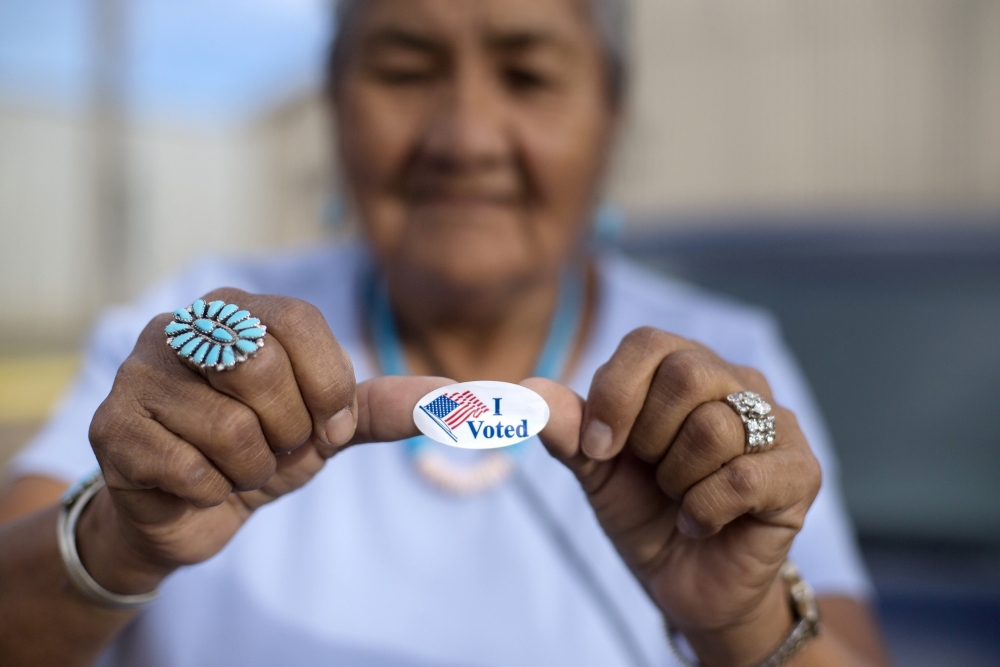
- Details
- By DILLON CHAVEZ
OPINION. What would grandma and grandpa do? Or better yet, ask yourself what have grandma and grandpa done for you?
Do you remember when grandma gave you 50 cents to buy a pickle at the Pow-Wow? What about that time grandpa bought you those new basketball shoes? Grandpa would tell stories of the ancestors and grandma would show you string games to pass time in the winter. How about the time the community elders spoke up for you at the council meeting to receive a tribal scholarship?
Our elders raised us to be mindful and resilient as they were in their youth. And that's no small comparison being that they bore witness to the occupation of Alcatraz Island, being subjects to the horrors of Indian boarding schools, and living through assimilation policies. This year alone, Indian Country witnessed the Trump administration's attempt to disestablish the reservation status of the Mashpee Wampanoag Tribe in Massachusetts. This move is a bitter reminder that even in the 21st century, Native American sovereignty is not always secure.
Young Native voters, you are the Indigenous warriors of the contemporary era. Our great-grandparents and grandparents lived in a time when they could send their children to war but were not able to vote. Your parents remember a time when voter suppression methods were enacted to discourage them from casting a ballot. And now, we as young Native Americans are bearing witness to a renewed assault on Turtle Island and our voting rights. The 2020 general election can be our greatest form of resistance meant to stop these discriminatory actions throughout Indian Country.
Former Vice President Joe Biden has repeatedly stated throughout his presidential campaign that we are fighting for the soul of our nation. As an extension, Native Americans are fighting for the country’s 574 tribal nations' right to simply exist. The best method of ensuring that Native sovereignty persists beyond 2020 is supporting the candidate that will honor treaty obligations and maintain tribal relations. The Trump administration’s direct actions against the Mashpee Wampanoag Tribe serves as a warning of what could happen to more tribes if not deterred.
The youth and overall Native vote is typically smaller when compared to other voting demographics. The turnout is even smaller for younger Native people. However, more so than ever, small voting numbers could very well be the decisive push Democrats need to claim the White House and flip party control of the Senate. Interesting enough, the areas that could help decide both outcomes are in states with significant Native populations.
States like Arizona, Texas, Ohio and North Carolina have shown in recent polling they fall into a margin of error of 1-4 percent. Native American populations also represent a small margin of 0.2-3.9 percent within these same states. If a high turnout by Native American voters can be achieved, small percentages can have a tremendous impact on determining which political party will receive critical electoral votes.
Close Senate races in Alaska, Montana, Texas, Kansas, North Carolina, Michigan and Maine also fall into polling margins of error between 1-5 percent. Again, Native American populations represent small margins of 0.2-12 percent but in teetering elections, the smallest of percentages can have the biggest impact.
Too often do we hear "My vote doesn't really matter" from young people all over the country, and that can be especially true for younger Native Americans that are already part of a small voting bloc. But like I mentioned, polling suggests many critical election races will come down to razor thin margins and the power of the Native vote could serve as the deciding factor the country needs. When we, as young Native voters, think our little vote can't sway elections, don't believe it — the math says otherwise.
Still don’t believe me? Take for example the fact that young voter participation increased by 16 percent in 2018 and not only helped flip the House but also placed the first two Native American women in Congress: Deb Haaland (NM-01) and Sharice Davids (KS-03).
So ask yourselves: What would grandma and grandpa do? As Native people, not only did they survive times of uncertainty and oppression, they also preserved our way of life. As their descendants, we are their living legacy. For more than 500 years, resistance has been a necessity taken on by Indigenous peoples — our elders did it, our parents did it, and now it's our turn. The form of resistance we take exists in the form of a ballot.
The opportunity is there, so let’s take it. The future is ours to form, so let’s seize it. Our ancestors sacrificed a lot so that we, as Native people, could have the right to be heard. We honor them by utilizing our voice. Vote.
Dillon Chavez is a citizen of the Navajo Nation and lives in New Mexico.
Help us defend tribal sovereignty.
At Native News Online, our mission is rooted in telling the stories that strengthen sovereignty and uplift Indigenous voices — not just at year’s end, but every single day.
Because of your generosity last year, we were able to keep our reporters on the ground in tribal communities, at national gatherings and in the halls of Congress — covering the issues that matter most to Indian Country: sovereignty, culture, education, health and economic opportunity.
That support sustained us through a tough year in 2025. Now, as we look to the year ahead, we need your help right now to ensure warrior journalism remains strong — reporting that defends tribal sovereignty, amplifies Native truth, and holds power accountable.
 The stakes couldn't be higher. Your support keeps Native voices heard, Native stories told and Native sovereignty defended.
The stakes couldn't be higher. Your support keeps Native voices heard, Native stories told and Native sovereignty defended.
Stand with Warrior Journalism today.
Levi Rickert (Potawatomi), Editor & Publisher
